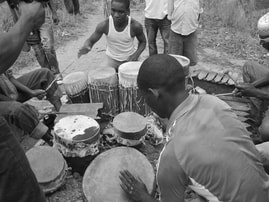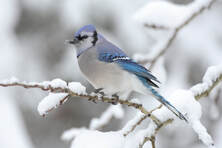
Post 3.
Vincent Bates has a long body of work considering issues of social class, rurality, and sustainability. Vincent and I have previously worked together, and have even published together "A Music Educator's Guide to Saving the Planet." When we presented that research at a Music Education conference dedicated to analyzing "ecosystems" and music education, our presentation and one of the keynotes were the only two that discussed ecology in that word's generally understood sense. That is, as ecofeminist author Rosemary Radford Ruether writes in her book Gaia & God, "The word ecology comes from the biological science of natural environmental communities. It examines how natural communities function to sustain a healthy web of life and how they become disrupted , causing death to plant and animal life." It seemed music education had a desire (conscious or unconscious) to avoid considering ecology as the web of life. In an era defined by climate change, e-waste, the Great Pacific Garbage Patch, and climate refugees escaping unprecedented natural disasters, this seemed unacceptable.
Beginning in 2017, Bates and I conceived and then began writing a potential Action Ideal for the MayDay Group, which is an international music education organization, and according to Wikipedia "the main alternative to NAfME." The Action Ideals were identified as Action for Change in 1997, and reformulated in 2011. The 9th Action Ideal on Ecology, was written, distributed, critiqued by the group's membership and within the Steering Committee specifically, voted-on and approved, re-written to account for suggestions, and released this week. As the MayDay website says: "In light of the climate crisis, Ideal IX was developed over the course of 2017-2018 and feedback was received from the membership throughout 2018-2019. The purpose of this ideal is to draw attention toward ecological matters and the need for sustainability while also reframing the issue beyond anthropocentric optics. In early 2020, the Steering committee voted to fully adopt the ecologically-directed action idea."
I believe this new Action Ideal to be a first for a Music Education institution, and truly takes seriously the ecological crises seriously. Perhaps it can become a model for other institutions. Here is the Action Ideal in its entirety as approved and published by the MayDay Group.
DJS
Image
IX: Music education practices are inescapably bound within ecology—interactions among organisms and physical environments. Diverse cultures and species can be sustained by environmentally regenerative music education attuned to cultural and physical commons, pollution-free soundscapes, the inherent value of non-human being, and people musicking for environmental activism.We live in a time defined by ecological crises, many of which intersect with and initiate economic, gender, racial, and other injustices. Long-placed, sustainable, and indigenous cultures throughout the world contrast with an uprooting industrial culture that has brought Mother Earth to the brink of ecological collapse. Music education has an essential role to play in cultivating eco-literacy, educating citizens to take action in alleviating ecological crises. Therefore, we should critically review former, current, and upcoming musical practices from an ecological scope, taking into consideration the following questions.
Link to the Action Ideals: http://www.maydaygroup.org/about-us/action-for-change-in-music-education/
Vincent Bates has a long body of work considering issues of social class, rurality, and sustainability. Vincent and I have previously worked together, and have even published together "A Music Educator's Guide to Saving the Planet." When we presented that research at a Music Education conference dedicated to analyzing "ecosystems" and music education, our presentation and one of the keynotes were the only two that discussed ecology in that word's generally understood sense. That is, as ecofeminist author Rosemary Radford Ruether writes in her book Gaia & God, "The word ecology comes from the biological science of natural environmental communities. It examines how natural communities function to sustain a healthy web of life and how they become disrupted , causing death to plant and animal life." It seemed music education had a desire (conscious or unconscious) to avoid considering ecology as the web of life. In an era defined by climate change, e-waste, the Great Pacific Garbage Patch, and climate refugees escaping unprecedented natural disasters, this seemed unacceptable.
Beginning in 2017, Bates and I conceived and then began writing a potential Action Ideal for the MayDay Group, which is an international music education organization, and according to Wikipedia "the main alternative to NAfME." The Action Ideals were identified as Action for Change in 1997, and reformulated in 2011. The 9th Action Ideal on Ecology, was written, distributed, critiqued by the group's membership and within the Steering Committee specifically, voted-on and approved, re-written to account for suggestions, and released this week. As the MayDay website says: "In light of the climate crisis, Ideal IX was developed over the course of 2017-2018 and feedback was received from the membership throughout 2018-2019. The purpose of this ideal is to draw attention toward ecological matters and the need for sustainability while also reframing the issue beyond anthropocentric optics. In early 2020, the Steering committee voted to fully adopt the ecologically-directed action idea."
I believe this new Action Ideal to be a first for a Music Education institution, and truly takes seriously the ecological crises seriously. Perhaps it can become a model for other institutions. Here is the Action Ideal in its entirety as approved and published by the MayDay Group.
DJS
Image
IX: Music education practices are inescapably bound within ecology—interactions among organisms and physical environments. Diverse cultures and species can be sustained by environmentally regenerative music education attuned to cultural and physical commons, pollution-free soundscapes, the inherent value of non-human being, and people musicking for environmental activism.We live in a time defined by ecological crises, many of which intersect with and initiate economic, gender, racial, and other injustices. Long-placed, sustainable, and indigenous cultures throughout the world contrast with an uprooting industrial culture that has brought Mother Earth to the brink of ecological collapse. Music education has an essential role to play in cultivating eco-literacy, educating citizens to take action in alleviating ecological crises. Therefore, we should critically review former, current, and upcoming musical practices from an ecological scope, taking into consideration the following questions.
- What actions can music educators and institutions take to enact sustainable approaches to music teaching and learning and to foster the genuine interest of music educators and learners for the sustainability of local and global natural ecologies and soundscapes, as well as the musical practices that originate from them?
- In what ways do some musical and educational cultures and practices sustain local ecologies, while others are environmentally destructive?
- How often and to what degree do the actions of music educators in economically, industrially, and militarily dominant countries impact ecological systems throughout the world?
- In what ways do environmental justice and musical diversity intersect with class, gender, race, place, ability, and other relevant categories of experience within the field of music teaching and learning?
Link to the Action Ideals: http://www.maydaygroup.org/about-us/action-for-change-in-music-education/

 RSS Feed
RSS Feed
